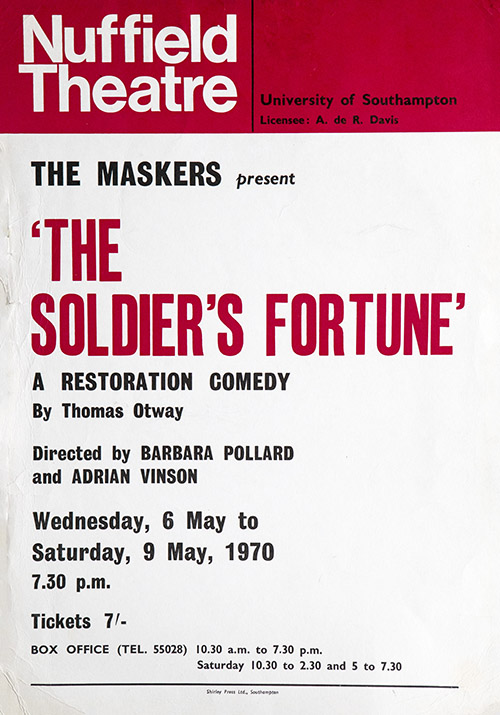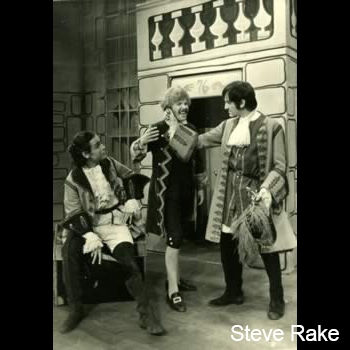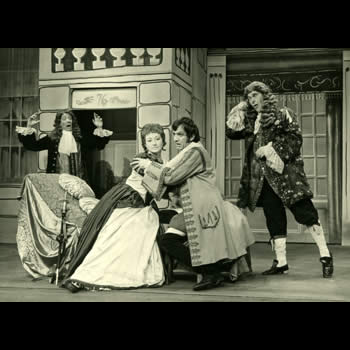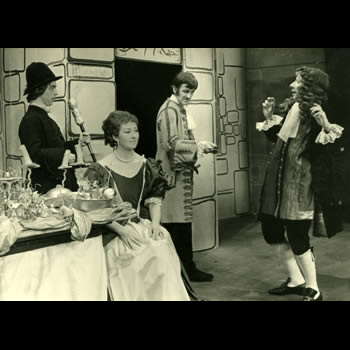Nuffield Theatre
on6th to 9th May 1970

Adrian and Barbara wrote:
Thomas Otway was born in 1652, the son of a Sussex clergyman. He was educated at Winchester College, and then at Oxford, which he left without a degree, due to poverty, on his father's death. Moving to London, he turned first to acting,, at which he was a notable failure, and then to playwriting, at which he was a moderate success. He fell in love with Elizabeth Barry, an actress in his first play, who was to become the English stage's first leading lady. Though Otway's attentions persisted for seven years, Mrs Barry consistently ignored them, bestowing her favours instead on his patron, the Earl of Rochester, and on his fellow playwright Sir George Etherege.
In 1678, financially embarrassed and emotionally frustrated, Otway obtained a commission in an English regiment serving under Louis XIV in the Flemish wars The conclusion of a sudden peace resulted in the disbandment of the regiment, and the officers were paid off in virtually worthless bonds. It is just this situation in which Beauregpad and Courtine are placed in the opening of "The Soldier's Fortune", and in their raillery against fortune and the 'stay-at-homes' who deride them, Otway's 'heroes' are the mouthpiece for his own bitterness and humiliation.
'The Solider's Fortune' is autobiographical in another sense. Its principal theme is the war between the sexes, and the absurdities and injustices of current marriage conventions. At its first production, in 1681, 'The Soldier's Fortune' was attacked as offensive to women, whose guile is central to the plot. Otway's barbed and ambivalent attitude to women and marriage is surely a product of his unrequited passion for Mrs Barry, who played Lady Dunce.
If Otway's wit does not match the brilliance of Congreve or Wycherley, the comic success of 'The Soldier's Fortune' is derived from his firm grasp of farcical situation, and from the characterisation of the two grotesque knights, Sir Jolly Jumble and Sir Davy Dunce. The latter, like much of the plot itself, reveals the author's close reliance on the style, and even the material of Moliere. The farcical element, combined with the distinctively ironic social comment, render 'The Soldier's Fortune' particuarly approrpriate for revival at a time when 'black comedy' is an acknowledged dramatic form.
In 1682, Otway produced his first play - 'Venice Preserved'. the most distinguished tragedy of the period. In its scorn for contemporary value this play presents a starker mirror for the attitudes which underlie the comedy of 'The Soldier's Fortune'. Otway sold the copyright of 'Venice Preserved' for a mere £15, and in 1685, at the age of thirty-three, he died in poverty, reputedly choking on a crust of bread in the pangs of starvation.
| Cast | |
| Captain Beauregard, a disbanded officer | John Mitchell |
| Courtine, his companion | Stephen Rake |
| Fourbin, servant to Beauregard | Ray Green |
| Sir Jolly Jumble | Roy Purkis |
| Whores | Jennifer Rodway, Nancy Hine, Jennifer Booth |
| Lady Dunce, wife to Sir Davy Dunce | Joy Steel |
| Sylvia, her niece | Miriam Rose |
| Maid | Georgina Bennett |
| Sir Davy Dunce | David Bartlett |
| Frisk | David Phillips |
| Vermin, servant to Sir Davy Dunce | Kenneth Hann |
| Landlord | David Phillips |
| Bloody-Bones | Peter White |
| Constable | Peter White |
| Watch | Michael Shailer |
| Citizens | Keith Hooper, Ivan White |
| For the Maskers: | |
| Technical Director | Ron Tillyer |
| Stage Managers | Tony Miles, Ron Avery |
| Stage Assistants | John Lelliott, John Young |
| Lighting | Roger Lockett, Geoff Callow, Colin Jurd |
| Sound | Geoff Grandy |
| Wardrobe | Sonia Morris |
| Wardrobe Assistants | Jo Bartlett, Jill Buchanan, Libby Cleaver, Liz Collings, Wendy Cooke |
| Properties | Sonia Morris, Patricia Nickell, Jenny Rodway, Jenny Edwards |
| Production Secretary | Sandra Crook |
| Production Assistants | Betty Riggs, Gillian Marvin |
| Publicity | Michael Shailer |
| Music | Malcolm Wilcock, Rosamund Williams |
click on a photo to enlarge it





